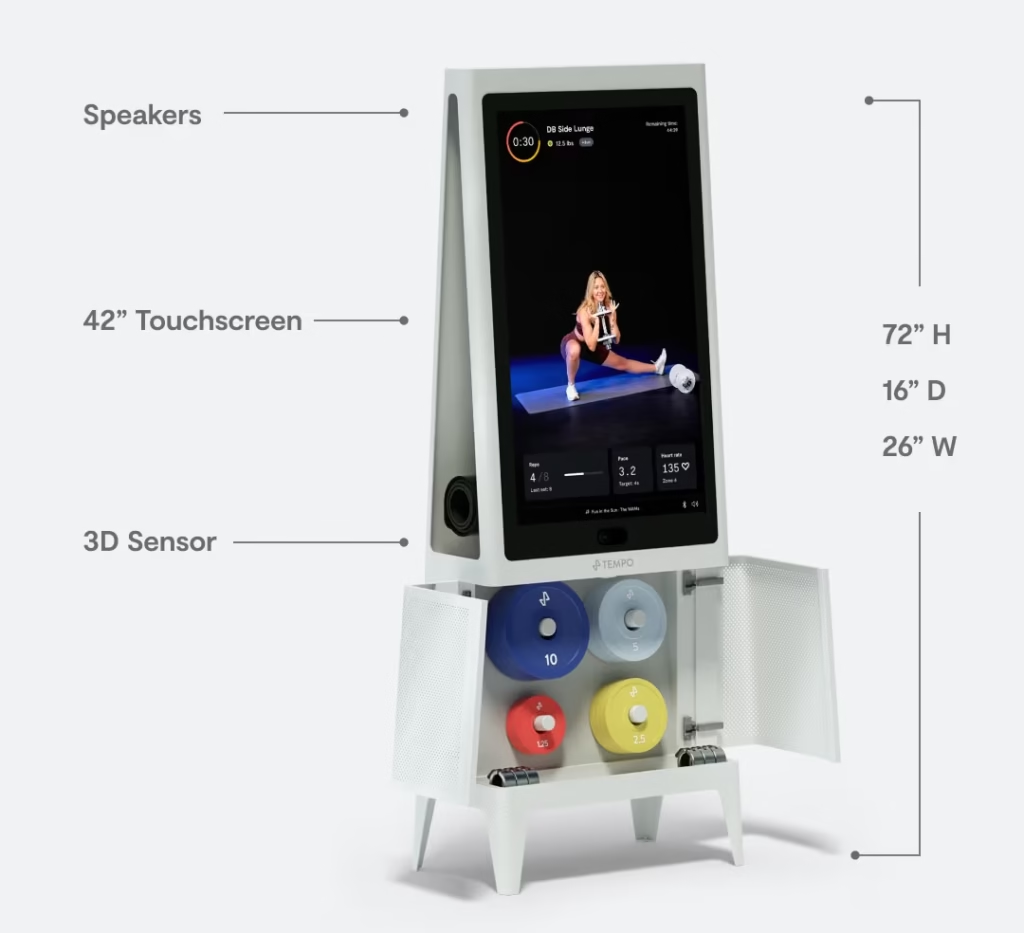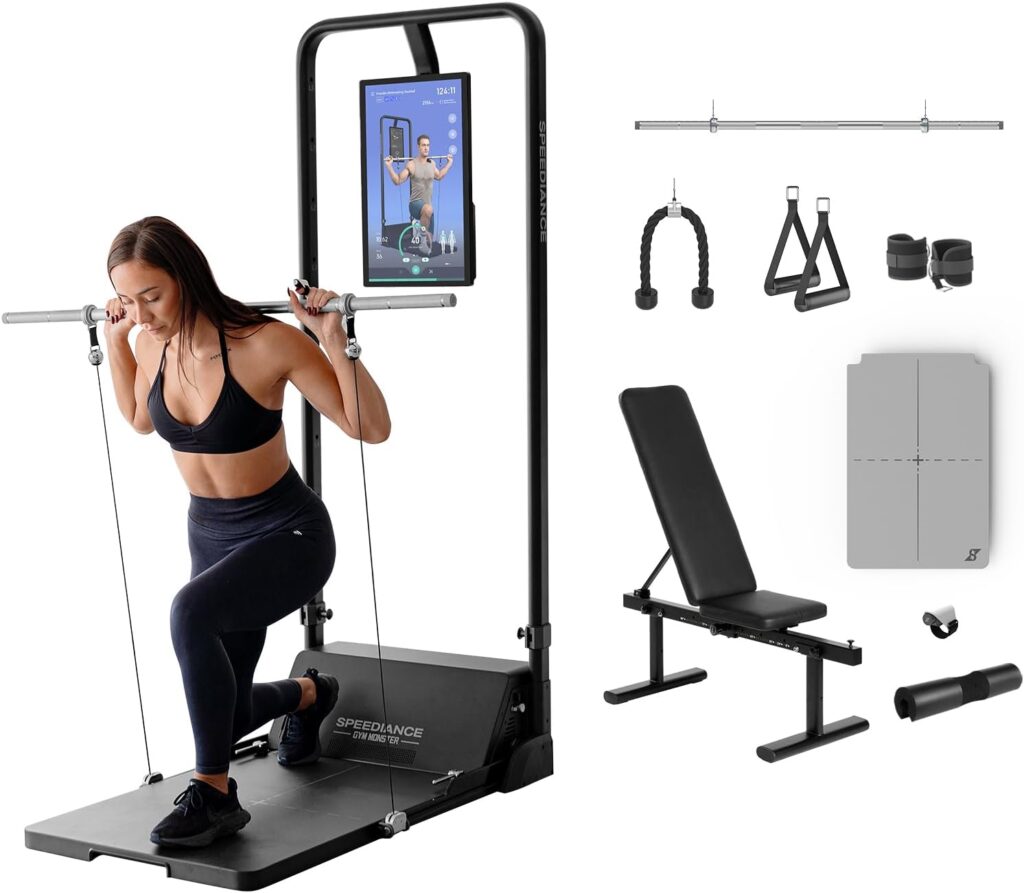Best Tonal Gym Alternatives
As the demand for home fitness solutions continues to grow, many consumers are looking beyond Tonal for their smart gym needs. While Tonal has made a name for itself in the connected fitness space, several choices offer unique features and experiences that may better suit certain people’ preferences and budgets. This review explores five notable Tonal choices: Vitruvian, Tempo Studio, Speediance, NordicTrack Fusion CST, and the Peloton Bike.
* This blog contains affiliate links, meaning I may earn a commission if you click through and make a purchase, at no additional cost to you. I only recommend products I trust and believe will add value to my readers.*
1. Speediance
Speediance is a newcomer to the smart gym market, offering a compact, wall-mounted solution similar to Tonal. This system aims to provide a comprehensive strength training experience in a space-saving design.
Key Features:
- Dual cable system with up to 220 pounds of resistance per arm
- 21.5-inch HD touchscreen display
- AI-powered workout recommendations
- Over 100 exercises available
- Foldable arms for easy storage
Speediance’s dual cable system allows for independent arm movements, enabling a wide range of exercises and promoting balanced muscle development. The foldable arms are a notable feature, allowing users to tuck the system away when not in use, making it an excellent option for people who have limited space.
While Speediance offers fewer exercises than Tonal, it’s AI-powered workout recommendations help users create personalized training plans based on their goals and progress. The system’s lower price point compared to Tonal may also make it an attractive option for budget-conscious consumers.
2. Vitruvian

The Vitruvian V-Form Trainer is a sleek and compact resistance training platform that offers a full-body workout experience. Unlike Tonal’s wall-mounted design, Vitruvian’s flat, portable platform can be easily stored when not in use, making it ideal for people who have limited space.
Key Features:
- Up to 440 pounds of resistance
- Adaptive force technology
- Over 200 exercises available
- Companion app with on-demand classes
- Portable design
Vitruvian’s adaptive force technology adjusts resistance in real-time based on your performance, ensuring an optimal workout every time. The platform’s versatility allows for a wide range of exercises, from traditional strength training movements to more dynamic, full-body workouts.
While Vitruvian lacks the large display screen found on Tonal, it’s companion app provides access to a library of on-demand classes and personalized workout plans. This app-based approach may appeal to users who prefer to use their own devices for guidance.
3. Tempo Studio

Tempo Studio takes a different approach to smart home fitness by combining weight training with AI-powered form correction. The system’s standout feature is it’s large, easel-like display that houses weights and provides real-time feedback on your form.
Key Features:
- 42-inch HD touchscreen display
- AI-powered form correction
- Includes barbells, dumbbells, and weight plates
- Live and on-demand classes
- 3D sensor technology for motion tracking
Tempo’s 3D sensor technology analyzes your movements in real-time, offering personalized recommendations to improve your form and technique. This feature is particularly beneficial for beginners or those looking to refine their lifting form.
The inclusion of free weights, such as barbells and dumbbells, provides a more traditional strength training experience compared to Tonal’s cable-based system. However, this also means Tempo needs more floor space and may not be suitable for people who have very limited room.
4. NordicTrack Fusion CST

The NordicTrack Fusion CST combines strength training with cardio workouts, offering a versatile solution for those seeking a comprehensive fitness experience. Unlike Tonal and other wall-mounted options, the Fusion CST is a freestanding unit that resembles traditional gym equipment.
Key Features:
- Silent Magnetic Resistance (SMR) technology
- 10-inch HD touchscreen display
- iFit compatibility for live and on-demand classes
- Adjustable resistance up to 100 pounds per pulley
- Includes a 1-year iFit membership
The Fusion CST’s Silent Magnetic Resistance technology provides smooth, quiet operation, making it suitable for apartment dwellers or those concerned about noise. The system’s integration with iFit offers a wide variety of workout options, including strength training, HIIT, and yoga classes.
While the Fusion CST doesn’t offer as much resistance as Tonal or Vitruvian, it’s combination of strength and cardio capabilities may appeal to users looking for a more well-rounded fitness solution. The freestanding design also means it can be placed anywhere in a room without the need for wall mounting.
5. Peloton Bike
Although primarily known for it’s cycling experience, the Peloton Bike has evolved to offer a more comprehensive fitness solution through it’s digital platform. While not a direct replacement for Tonal’s strength training focus, it’s worth considering for those who prioritize cardio and want access to strength and flexibility workouts.
Key Features:
- 22-inch HD touchscreen display
- Live and on-demand cycling classes
- Access to off-bike workouts, including strength training and yoga
- Compact footprint
- Community-driven experience
The Peloton Bike’s strength comes from it’s immersive cycling classes and strong community aspect. However, the Peloton digital platform also offers a growing library of strength training, yoga, and other off-bike workouts that can be accessed through the bike’s screen or via a separate app on other devices.
While the Peloton Bike doesn’t provide the same level of resistance training capabilities as Tonal or the other choices mentioned, it’s combination of high-quality cardio workouts and supplementary strength training content may be enough for users who prefer a cardio-focused fitness routine with some strength work on the side.
| Product | Max Resistance | Display Size | Unique Feature |
| Vitruvian | 440 lbs | App-based | Portable platform |
| Tempo Studio | Varies (free weights) | 42 inches | AI form correction |
| Speediance | 440 lbs (220 per arm) | 21.5 inches | Foldable arms |
| NordicTrack Fusion CST | 100 lbs per pulley | 10 inches | Silent Magnetic Resistance |
| Peloton Bike | N/A (cardio-focused) | 22 inches | Live cycling classes |
Each of these Tonal choices offers unique features and experiences that cater to different fitness preferences and space constraints. Whether you’re looking for a compact solution like Vitruvian, a form-focused experience like Tempo Studio, or a hybrid cardio-strength option like the NordicTrack Fusion CST, there’s likely an option that fits your specific needs and goals.
The Impact of Smart Home Gyms on Fitness Habits
The rise of smart home gyms has had a profound impact on how people approach their fitness routines. These systems have made it easier for individuals to maintain consistent workout schedules, leading to improved adherence to fitness goals.
Benefits of Smart Home Gyms
- Flexibility: Users can work out at any time, without being constrained by gym hours or class schedules.
- Variety: Many smart home gym systems offer a wide range of workout types, from strength training to cardio and yoga.
- Progress Tracking: Built-in tracking features allow users to watch their progress over time, providing motivation and insights.
- Cost-Effectiveness: While the initial investment may be significant, smart home gyms can be more cost-effective in the long run compared to ongoing gym memberships.
- Family-Friendly: Multiple user profiles allow family members to share the equipment, making fitness a family activity.
Frequently Asked Questions
How do smart home gyms compare to traditional gym memberships?
Smart home gyms offer unparalleled convenience and privacy, allowing users to work out on their own schedule without leaving home. While the initial investment may be higher, they can be more cost-effective in the long run compared to ongoing gym memberships.
However, they may lack the social aspect and variety of equipment found in traditional gyms.
Can smart home gyms provide effective strength training?
Yes, many smart home gyms offer resistance levels comparable to or exceeding those found in traditional gyms. Advanced systems can provide up to 440 pounds of resistance, suitable for even the most demanding strength training routines.
Are smart home gyms suitable for beginners?
Absolutely. Most smart home gyms offer beginner-friendly programs and AI-powered guidance to help new users develop proper form and technique.
The personalized nature of these systems makes them an excellent choice for those just starting their fitness journey.
How much space do I need for a smart home gym?
Space requirements vary depending on the system, but many smart home gyms are designed to be compact. Some wall-mounted options require as little as 2 square feet of floor space when not in use, while freestanding units may need a dedicated area of 5-10 square feet.
The Future of Fitness at Home
As technology continues to advance, the potential for smart home gyms seems limitless. Future developments may include more immersive virtual reality workouts, enhanced biometric tracking, and even more sophisticated AI coaching capabilities.
The integration of smart home gyms with other connected devices and health monitoring systems could provide a holistic approach to fitness and wellness, offering users unprecedented insights into their overall health and performance.
Final Analysis
Smart home gyms represent a significant leap forward in fitness technology, offering a compelling choice to traditional gym memberships. Their ability to provide personalized, data-driven workouts in the comfort and privacy of your home addresses many of the common barriers to consistent exercise.
While they may not be the perfect solution for everyone, smart home gyms are undoubtedly changing the fitness landscape and making it easier for people to maintain healthy, active lifestyles.

